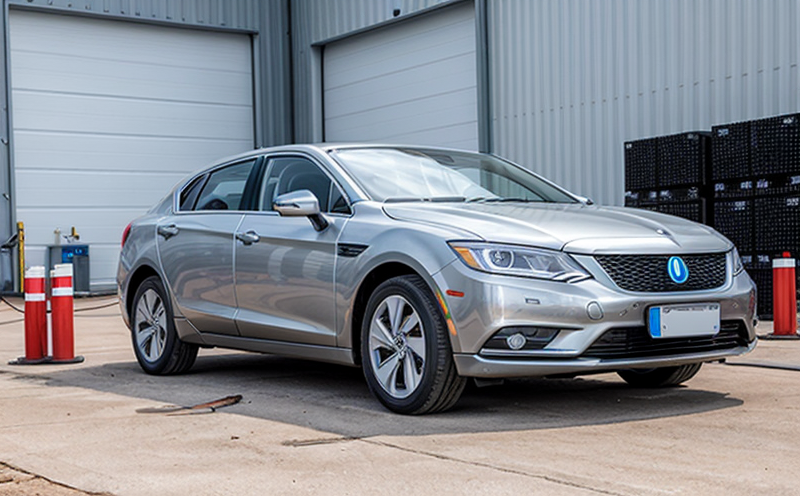ANSI C18.2M NiMH Secondary Battery Testing for Portable Applications
The ANSI C18.2M standard provides comprehensive guidelines for testing nickel-metal hydride (NiMH) secondary batteries used in portable applications such as consumer electronics, medical devices, and power tools. This testing ensures that the batteries meet strict performance criteria set by industry standards to ensure safety, reliability, and consistent quality.
The ANSI C18.2M standard is widely recognized for its rigorous approach to evaluating NiMH secondary batteries. It includes a series of tests designed to assess various performance metrics including internal resistance, voltage, capacity retention, self-discharge rate, and more. These tests are critical in ensuring that the battery performs optimally under real-world conditions.
Internal resistance testing is essential for determining how much energy can be efficiently delivered by the battery without causing a significant drop in voltage during discharge. Voltage measurements help ensure consistent output throughout the battery's lifespan. Capacity retention tests assess the ability of the battery to maintain its initial capacity over time, which is crucial for portable devices that rely on long-lasting power sources.
The self-discharge rate test evaluates how quickly the battery loses its charge when not in use, affecting the overall efficiency and usability of the device. These tests are conducted under controlled conditions to simulate real-world usage scenarios, providing valuable insights into the performance of NiMH secondary batteries across different applications.
Testing according to ANSI C18.2M ensures compliance with international standards, thereby enhancing trust in the quality and reliability of the products using these batteries. This standardization is particularly important for manufacturers aiming to meet regulatory requirements and ensure consistent product performance across various markets.
The stringent testing procedures outlined by ANSI C18.2M also facilitate continuous improvement in battery technology. By identifying areas where current models fall short, manufacturers can innovate and develop better-performing batteries that meet the evolving needs of consumers and industries.
In summary, ANSI C18.2M NiMH secondary battery testing is a critical process for ensuring the quality and reliability of portable device batteries. It supports compliance with industry standards, enhances product performance, and drives innovation in the development of advanced battery technologies.
Eurolab Advantages
- Comprehensive Testing Capabilities: Eurolab offers a full suite of testing services that cover all aspects of ANSI C18.2M NiMH secondary battery testing, ensuring comprehensive evaluation and compliance.
- State-of-the-Art Facilities: Our modern laboratories are equipped with the latest instrumentation and technology to conduct precise and reliable tests according to international standards.
- Expertise in Regulatory Compliance: Eurolab’s team of experts ensures that all testing aligns with current regulatory requirements, providing clients with peace of mind regarding compliance.
- Consistency in Results: Our standardized processes and rigorous quality control measures guarantee consistent and accurate test results every time.
- Fast Turnaround Times: Eurolab prides itself on delivering timely reports to keep projects moving smoothly without compromising on the thoroughness of testing.
- Customer-Centric Approach: We prioritize client satisfaction, offering personalized services and support throughout the testing process to ensure that our clients’ needs are met.
Eurolab’s commitment to excellence in testing ensures that manufacturers can rely on us for accurate and reliable results, supporting their efforts in maintaining high standards of quality and compliance.
Why Choose This Test
Selecting ANSI C18.2M NiMH secondary battery testing is advantageous for several reasons. Firstly, it ensures that the batteries meet stringent industry standards, enhancing overall product reliability and performance. Compliance with these standards also fosters trust among consumers and regulatory bodies, which can positively impact brand reputation.
Testing according to ANSI C18.2M helps identify potential issues early in the development process, allowing manufacturers to make necessary adjustments before full-scale production. This proactive approach not only improves product quality but also reduces costs associated with rework or recall.
The test results provide valuable data that can be used for continuous improvement and innovation. By understanding how batteries perform under various conditions, manufacturers can refine their designs and processes to create more efficient and durable products. This leads to enhanced market competitiveness and better satisfaction among end users.
Moreover, ANSI C18.2M testing supports global market entry by ensuring that the batteries are compatible with international standards. This is particularly beneficial for companies operating in multiple countries where compliance with local regulations is essential.
In conclusion, choosing ANSI C18.2M NiMH secondary battery testing is a strategic decision that strengthens product quality, enhances brand reputation, and opens up new market opportunities. It is an indispensable step towards delivering high-performance batteries that meet the highest standards of reliability and safety.
Competitive Advantage and Market Impact
- Enhanced Product Quality: Meeting ANSI C18.2M ensures that your products consistently deliver superior performance, setting you apart from competitors in a crowded market.
- Better Consumer Trust: Compliance with industry standards builds trust among consumers and regulatory bodies, leading to increased customer satisfaction and loyalty.
- Global Market Access: ANSI C18.2M testing facilitates entry into international markets by ensuring compliance with local regulations and expectations.
- Innovation Support: The insights gained from rigorous testing can drive innovation, allowing you to stay ahead of the competition through cutting-edge product development.
- Cost Efficiency: Early detection of issues during testing reduces the risk of costly rework or recall later in the production cycle.
- Regulatory Compliance: Ensuring compliance with ANSI C18.2M helps avoid penalties and legal issues associated with non-compliance, protecting your business from potential risks.
By leveraging Eurolab’s comprehensive testing services for ANSI C18.2M NiMH secondary batteries, you can gain a significant competitive edge in the market. Our expertise ensures that your products are not only compliant but also exceed expectations, paving the way for sustained success and growth.





